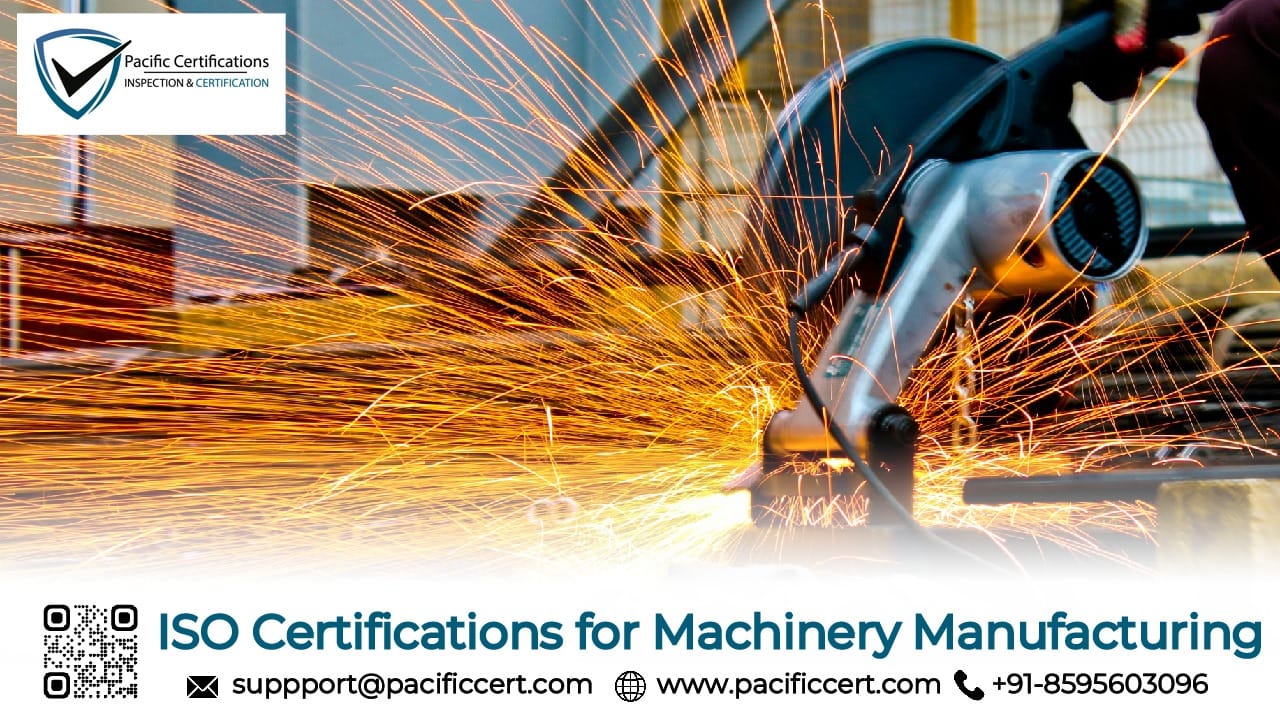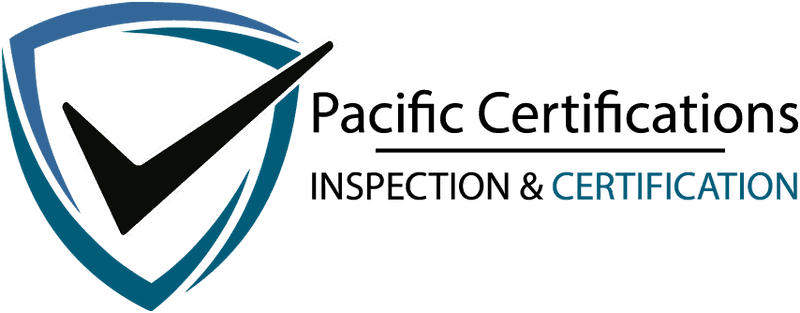ISO Certifications for Machinery Manufacturing Businesses, Requirements and Benefits

ISO Certifications for Machinery Manufacturing
ISO certifications are essential for machinery manufacturers aiming to deliver quality & safety. Meeting ISO standards ensures that your products align with global expectations. The manufacturing industry, especially machinery production, works on precision & performance. A vital part of achieving these qualities lies in compliance with global ISO standards.
ISO certifications are the benchmark for machinery manufacturers, ensuring their operations meet international expectations for safety and quality management. For machinery manufacturing, ISO standards are essential to managing risks and ensuring that products meet market expectations.
In today’s interconnected global supply chain, certified manufacturers build trust with suppliers, partners, and customers. From quality management to environmental responsibility, ISO certifications are indispensable for staying relevant in the evolving industrial landscape.
Ensure Compliance with ISO Standards for Machinery Manufacturing – Contact us today at [email protected] to begin your ISO certification journey with Pacific Certifications.
Applicable ISO Standards for Machinery Manufacturing
Machinery manufacturing is subject to multiple ISO standards covering different operational areas. Here are some of the key ISO certifications relevant to this industry:
ISO 9001: Quality Management Systems (QMS)
ISO 9001 ensures that manufacturers establish and maintain robust quality management systems. It focuses on customer satisfaction, continuous improvement, and efficient processes to meet or exceed product quality expectations.
ISO 45001: Occupational Health and Safety Management System (OH&S)
This standard emphasizes creating a safe working environment for employees involved in manufacturing operations. It helps machinery producers identify hazards, reduce accidents, and promote workforce well-being.
ISO 14001: Environmental Management Systems (EMS)
Machinery manufacturing involves processes that can impact the environment. ISO 14001 sets guidelines for environmental responsibility, waste management, and pollution control, helping companies meet regulatory obligations and sustainability goals.
ISO 50001: Energy Management Systems (EnMS)
With the growing focus on energy efficiency, ISO 50001 enables machinery manufacturers to optimize energy consumption, reduce costs, and achieve sustainable production practices.
ISO 12100: Safety of Machinery – General Principles for Design
This specific standard ensures that machinery is designed with safety as a priority. It provides guidelines for identifying and eliminating risks during the design phase, ensuring safer products for users.
ISO/IEC 27001: Information Security Management
For companies relying on complex manufacturing technologies and data-driven operations, ISO/IEC 27001 is crucial to protect sensitive information, intellectual property, and operational data.
Each ISO certification serves a unique purpose in machinery manufacturing, but collectively, they build a solid framework for achieving operational goals.
Click here to find out more applicable standards to your industry
Looking to streamline your manufacturing operations with ISO certification? Get in touch at [email protected] or reach us at +91-8595603096 for expert certification support.
How We Can Help
We are an ABIS accredited certification body, we specialize in conducting thorough audits to assess your readiness for ISO certification. Our role is to provide independent, impartial evaluations, ensuring your operations align with the necessary ISO requirements, our services include:
- Comprehensive Audits: We assess your processes to ensure compliance with ISO standards.
- Timely Certification Issuance: Once compliance is confirmed, we issue certificates swiftly to help you meet market demands.
- Global Recognition: ISO certifications issued by Pacific Certifications are recognized internationally.
Whether you're pursuing ISO 9001 for quality management or ISO 14001 for environmental responsibility, Pacific Certifications will guide you through every step of the certification process. Contact us at [email protected] or call +91-8595603096 to start your audit process today!
Requirements of ISO Certifications for Machinery Manufacturing
Compliance with ISO standards ensures that organizations meet global benchmarks for quality, safety and other areas. Below are the core requirements of each relevant ISO standard for machinery manufacturing:
ISO 9001: Quality Management Systems (QMS)
Key Requirements of ISO 9001
- Context of the Organization: Identify internal and external factors affecting business objectives.
- Leadership Commitment: Top management must demonstrate commitment to the QMS by setting goals and assigning responsibilities.
- Risk-Based Thinking: Incorporate risk identification and mitigation within all processes.
- Customer Focus: Ensure that customer expectations are met or exceeded through quality control.
- Documentation and Records: Maintain up-to-date policies, procedures, and records.
- Performance Monitoring: Use KPIs and audits to monitor and improve processes.
- Continuous Improvement: Regularly evaluate processes and make improvements based on feedback and performance data.
ISO 45001: Occupational Health and Safety Management System (OH&S)
Key Requirements of ISO 45001
- Hazard Identification and Risk Assessment: Assess workplace risks and hazards regularly.
- Employee Involvement: Ensure employees are engaged in safety initiatives and reporting hazards.
- Legal Compliance: Adhere to occupational safety and health regulations.
- Control of Risks: Implement control measures to mitigate identified risks.
- Training and Competency: Provide necessary health and safety training to employees.
- Emergency Preparedness: Develop and test emergency plans to manage incidents effectively.
- Incident Reporting and Investigation: Establish systems for reporting and investigating accidents.
- Monitoring and Review: Conduct regular safety audits to ensure continuous improvement.
ISO 14001: Environmental Management Systems (EMS)
Key Requirements of ISO 14001
- Environmental Policy: Develop an environmental policy aligned with the organization’s activities.
- Identification of Environmental Aspects: Identify activities that impact the environment, such as emissions, waste, and resource use.
- Compliance Obligations: Ensure adherence to environmental regulations and commitments.
- Environmental Objectives and Targets: Set measurable goals to improve environmental performance.
- Operational Control: Establish controls to manage environmental aspects and mitigate impact.
- Monitoring and Measurement: Track environmental performance indicators, such as energy consumption and waste management.
- Internal Audits and Reviews: Conduct periodic reviews to ensure compliance and continuous improvement.
ISO 50001: Energy Management Systems (EnMS)
Key Requirements of ISO 50001
- Energy Policy: Develop a policy to optimize energy use.
- Energy Review: Analyze past and current energy usage to identify areas for improvement.
- Energy Performance Indicators (EnPIs): Define metrics to monitor energy performance.
- Objectives and Targets: Set measurable energy-saving goals.
- Action Plans: Implement projects and initiatives to improve energy efficiency.
- Monitoring and Measurement: Continuously track energy consumption and review performance.
- Employee Awareness and Training: Educate staff on energy-saving practices.
- Management Review: Conduct periodic reviews to assess the effectiveness of energy management systems.
ISO 12100: Safety of Machinery – General Principles for Design
Key Requirements of ISO 12100
- Risk Assessment: Identify and evaluate risks associated with machinery throughout its lifecycle.
- Risk Reduction Measures: Apply safety principles to eliminate or reduce risks to acceptable levels.
- Design for Safety: Ensure machinery is inherently safe by design, avoiding foreseeable hazards.
- Protective Measures: Implement safety guards, interlocks, and other physical barriers to protect operators.
- User Information: Provide detailed instructions and warning signs to inform users of risks and safety procedures.
- Compliance with Regulations: Ensure the machinery meets local and international safety regulations.
- Periodic Testing and Validation: Regularly test machinery safety features to maintain compliance.
ISO/IEC 27001: Information Security Management System (ISMS)
Key Requirements of ISO/IEC 27001
- Information Security Policy: Develop a policy that outlines the organization’s approach to managing information security.
- Risk Assessment: Identify potential information security risks and develop mitigation strategies.
- Access Control: Ensure only authorized personnel have access to sensitive information.
- Physical and Environmental Security: Protect facilities and equipment from physical threats.
- Incident Management: Establish procedures for responding to security breaches and incidents.
- Training and Awareness: Educate employees on cybersecurity best practices.
- Monitoring and Measurement: Continuously monitor the information security system for vulnerabilities.
- Internal Audits: Conduct regular audits to ensure compliance with the ISMS requirements.
By meeting these ISO requirements, machinery manufacturers ensure safe operations and high-quality products. Implementing these systems also promotes efficiency and reduces risks.
Need ISO certification to meet global machinery manufacturing standards? Our team is ready to help. Email us at [email protected] or dial +91-8595603096 for more information.
Benefits of ISO Certifications for Machinery Manufacturing
ISO certifications offer numerous advantages to machinery manufacturers. Here’s how your business stands to gain:
- Competitiveness: ISO certifications improve product quality and reliability, making your machinery more attractive to customers globally.
- Safety: ISO 45001 and ISO 12100 ensure safe operations, reducing workplace accidents and liabilities.
- Efficiency: By adopting ISO 9001, manufacturers streamline processes, minimize waste, and optimize resource allocation.
- Compliance: ISO 14001 helps machinery producers meet environmental regulations, avoiding penalties and enhancing brand reputation.
- Energy Savings: ISO 50001 assists in reducing energy consumption, leading to cost savings and a smaller carbon footprint.
- Data Security: ISO/IEC 27001 ensures the protection of sensitive information, safeguarding intellectual property and customer data.
In a competitive global market, certified companies are more likely to attract business partnerships and secure long-term contracts.
Stay ahead of the competition with ISO certification! Reach out to us via [email protected] or call +91-8595603096 to discuss your certification needs.
Also, there a surge in demand for certified machinery, driven by growing concerns over environmental sustainability and safety compliance. Governments worldwide are tightening regulations on machinery manufacturing, making ISO certifications a critical requirement for market entry.
Additionally, the rise of smart manufacturing and Industry 4.0 technologies has increased the need for ISO/IEC 27001 to protect data integrity in automated processes.
Position your machinery manufacturing business for global success with internationally recognized ISO certifications. Partner with Pacific Certifications to ensure seamless audits and prompt certification issuance.
Pacific Certifications is accredited by ABIS, in case you need support with ISO certification for your Machinery Manufacturing business, please contact us at [email protected] or +91-8595603096.
FAQs: ISO Certifications for Machinery Manufacturing
What is the most relevant ISO certification for machinery manufacturing?
The most important ISO certification is ISO 9001, which ensures consistent quality management. However, safety standards like ISO 12100 and ISO 45001 are equally crucial for safe operations.
How long does the ISO certification process take?
The duration depends on the organization’s readiness and the specific ISO standard being pursued. Typically, it takes between 3 to 6 months to complete audits and receive certification.
Why is ISO 14001 important for machinery manufacturers?
ISO 14001 helps manufacturers manage environmental impacts by setting up sustainable practices, reducing waste, and ensuring compliance with environmental laws.
Can ISO certifications improve market access?
Yes, ISO certifications enhance marketability by demonstrating compliance with international standards, increasing the chances of securing partnerships and contracts.
What role does Pacific Certifications play in the ISO certification process?
Pacific Certifications provides audit and certification services. We assess your operations for compliance with the desired ISO standard and issue certification upon successful audit completion.
Do ISO certifications require renewal?
Yes, most ISO certifications require periodic surveillance audits and renewal every three years to maintain certification validity.
Read More at: Blogs by Pacific Certifications

